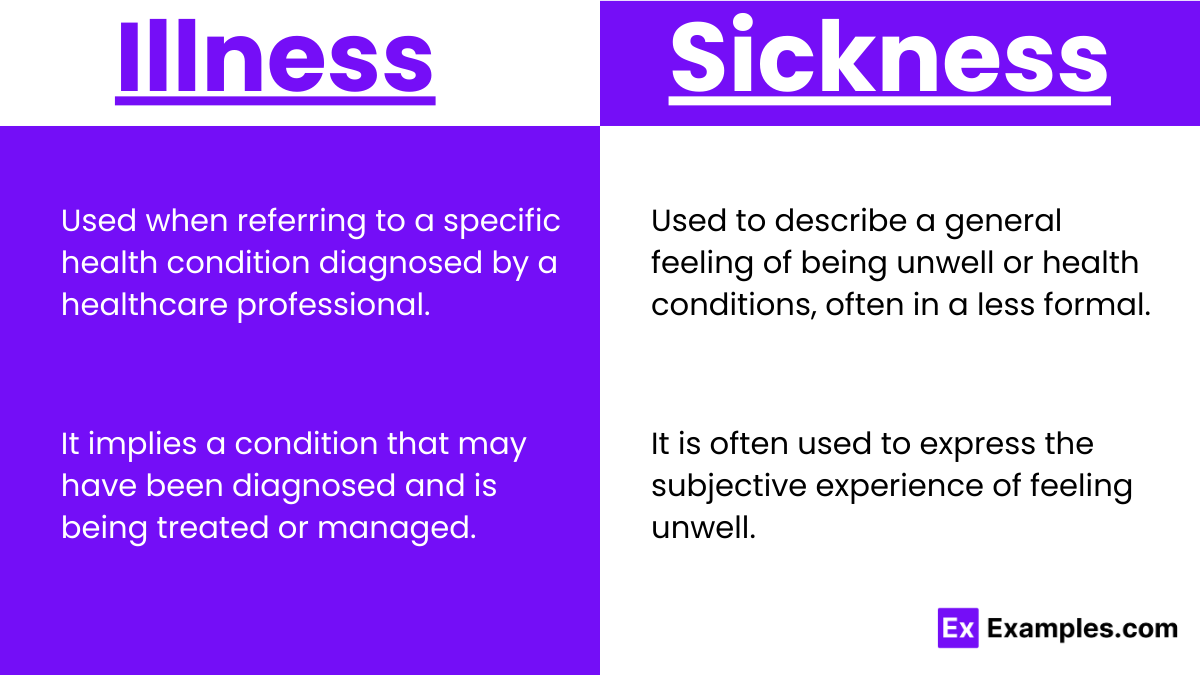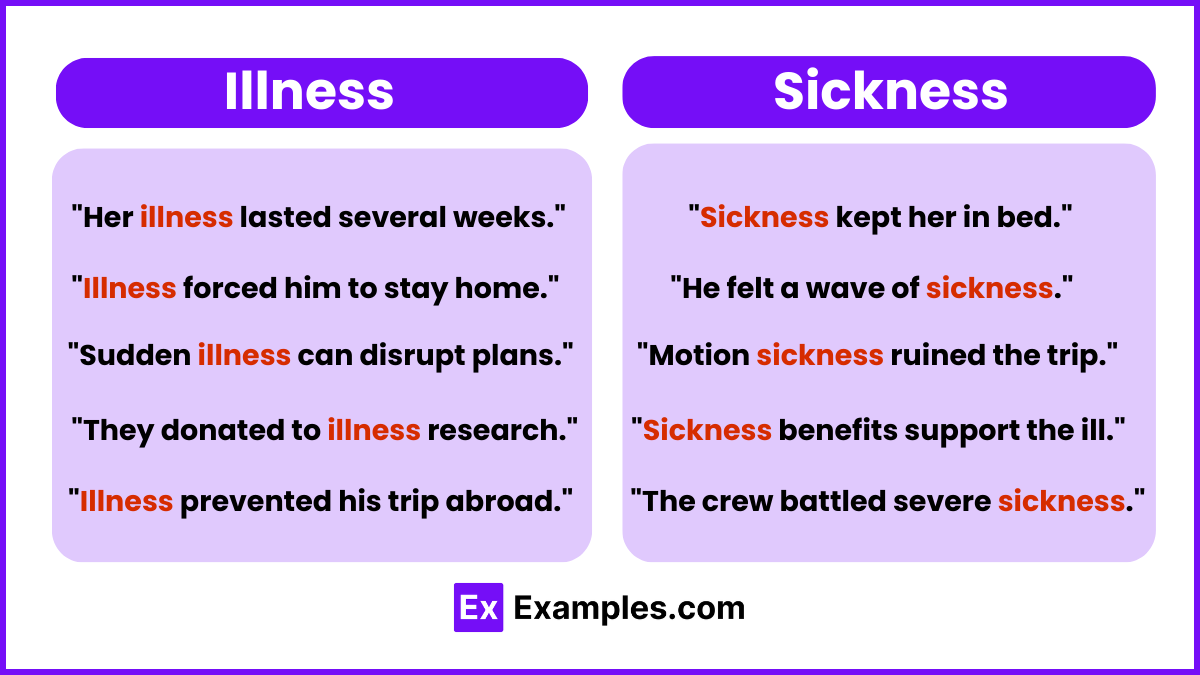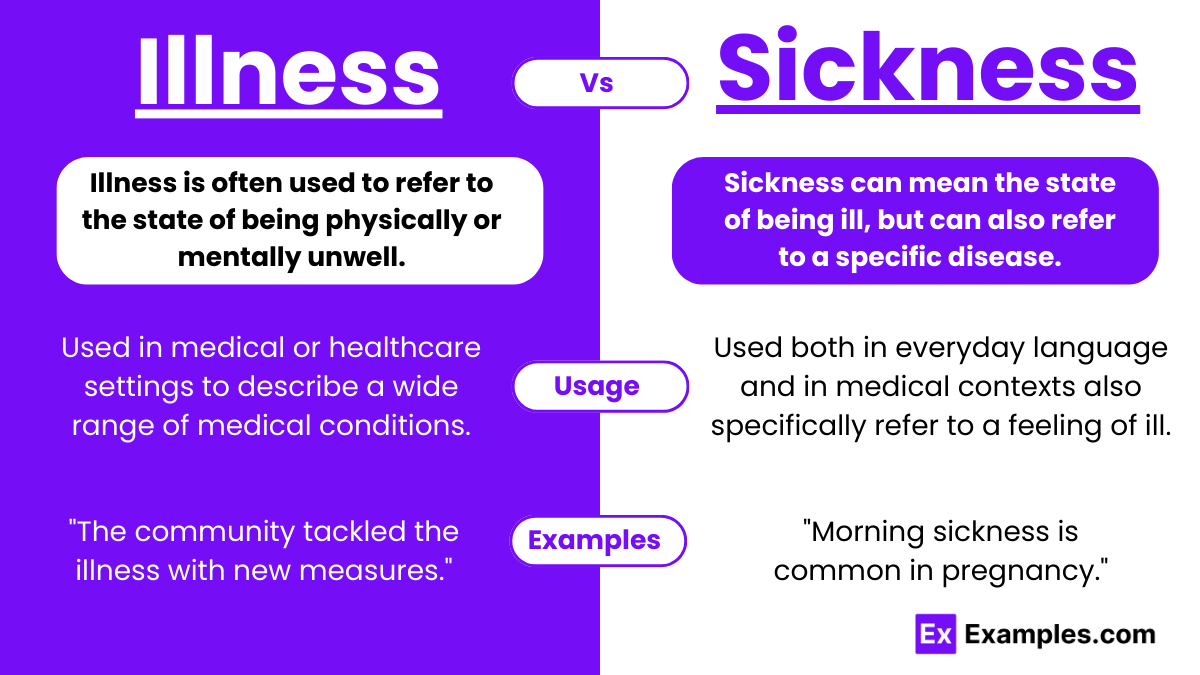Illness vs Sickness – Difference, Meanings, Examples, Usage
Understanding the difference between ‘illness‘ and ‘sickness‘ can sometimes be a challenge, as these terms often appear to mean the same thing. However, knowing when and how to use them correctly can greatly improve clarity in communication. This guide aims to dissolve any confusion students may have regarding these terms, ensuring they can confidently distinguish between them in their writing and speech. So, let’s dive in and clarify these commonly confused words, making sure that next time you need to express a state of not being well, you’ll know exactly which term to choose.
Illness and Sickness – Meanings
“Illness” and “Sickness” are both terms commonly used in English to describe a state of not being well or having a health condition.
- Illness: Firstly, “illness” refers to a condition affecting one’s physical or mental health. It’s a broad term that covers various types of health issues, ranging from a common cold to chronic conditions like diabetes. The term emphasizes the medical or clinical aspects of being unwell. When one mentions “illness,” it suggests a diagnosis or a recognized health issue that might require medical attention or treatment.
- Sickness: On the other hand, “sickness” is a more general term that can describe the feeling of being unwell or the state of having a disease. It’s often used interchangeably with “illness” but can also imply a perception or experience of health problems, not just the diagnosis. “Sickness” can also imply the subjective experience of feeling unwell, regardless of whether a formal diagnosis has been made.
Summary
“Illness” refers to specific health conditions diagnosed by doctors, focusing on medical details. It emphasizes the biological or pathological aspects and is used more in clinical or medical discussions. “Sickness” is a broader term for feeling unwell, covering both physical symptoms and how individuals and society perceive and react to them. In everyday language, “sickness” might be used more casually to describe a general feeling of unhealthiness or to refer to specific conditions, especially those that are contagious or visible.
How to pronounce Illness and Sickness
Illness: Pronounced as /ˈɪlnəs/ (il-nis).
Sickness: Pronounced as /ˈsɪknəs/ (sik-nis).
Differences between Illness and Sickness
| Aspect | Illness | Sickness |
|---|---|---|
| Definition | Illness is often used to refer to the state of being physically or mentally unwell. | Sickness can mean the state of being ill, but can also refer to a specific disease or ailment. |
| Connotation | Illness can have a slightly more formal or clinical connotation, often used in medical contexts. | Sickness can sometimes carry a broader or more general tone, and can also imply nausea or the act of vomiting. |
| Context of Use | Illness is more commonly used in medical or healthcare settings to describe a wide range of medical conditions. | Sickness is used both in everyday language and in medical contexts, but can also specifically refer to a feeling of nausea or to diseases that lead to vomiting. |
| Duration and Severity | Illness can imply a condition that is either acute or chronic, and it does not necessarily specify the severity. | Sickness can be used for short-term conditions, often associated with a stronger sense of being unwell, such as with a stomach bug or flu. |
How to Remember the Difference between Illness and Sickness
To differentiate between “illness” and “sickness,” consider that “illness” often implies a specific, diagnosed condition and is used in more formal or clinical contexts. In contrast, “sickness” is broader and can refer to any general state of not feeling well, often used in everyday language.
When to Use Illness and Sickness

Usage of Illness
Use “illness” when referring to a specific health condition diagnosed by a healthcare professional.
Illness: This term is suitable for discussing specific health issues, especially in formal or medical contexts. It implies a condition that may have been diagnosed and is being treated or managed.
- Specific Health Conditions: Ideal for referring to diagnosed diseases or disorders.
- Formal Discussions: Used in medical, clinical, or formal health-related conversations.
- Mental Health: Applicable to both physical and mental health conditions.
- Long-term or Chronic Conditions: Often used for conditions that have a longer duration.
Usage of Sickness
Use “sickness” to describe a general feeling of being unwell or a range of health conditions, often in a less formal context.
Sickness: This term is versatile and can cover everything from minor ailments like a cold to more serious conditions, without necessarily being specific. It is often used to express the subjective experience of feeling unwell.
- General Feeling of Un wellness: For when feeling sick without a specific diagnosis.
- Everyday Language: Commonly used in informal conversations about health.
- Temporary Conditions: Suitable for short-term illnesses or common ailments.
- Non-Specific Conditions: When the exact nature or diagnosis of the health issue is not the focus.
Illness and Sickness – Examples

Illness Examples
- Moreover, the community tackled the illness with new measures.
- However, the illness spread despite efforts.
- Consequently, hospitals saw more illness cases.
- Furthermore, studies on the illness began.
- Additionally, awareness campaigns about the illness started.
Sickness Examples
- He missed work due to sickness.
- Morning sickness is common in pregnancy.
- Sea sickness ruined her cruise.
- Food sickness can be severe.
- Sickness rates spike in winter.
Synonyms
| Illness | Sickness |
|---|---|
| Disease | Ailment |
| Condition | Malady |
| Disorder | Affliction |
| Malaise | Un wellness |
| Syndrome | Ill health |
Exercise
- The health seminar focused on the prevention of heart-related __________.
- Travel __________ is common among tourists who visit high-altitude locations.
- The charity provides support for children suffering from serious __________.
- Food __________ can often be prevented with proper hygiene practices.
- The novel explores the protagonist’s battle with a life-altering __________.
- Workplace __________ policies need to accommodate for mental health days.
Answers
- illnesses
- sickness
- illnesses
- sickness
- illness
- sickness
FAQ’S
Is Illness and Sickness the Same?
No, ‘illness’ often refers to a specific diagnosed condition, while ‘sickness’ can be a broader, more general feeling of un wellness.
What is the Difference Between Feeling Ill and Sick?
Feeling ill typically implies a specific medical condition, whereas feeling sick can include general discomfort or nausea without a diagnosis.
Does Sick Mean Ill?
Yes, ‘sick’ can mean ‘ill,’ but it’s often used in a broader sense to describe general unwellness or nausea.
What is Considered Sickness?
Sickness encompasses a wide range of conditions from minor ailments like a cold to more serious diseases.
Is Fever an Illness?
Fever is a symptom, not an illness. It indicates the body is fighting an infection or other health condition.
How Many Illnesses Are There?
There are thousands of illnesses, ranging from common infections to rare diseases, each with unique causes and treatments.


